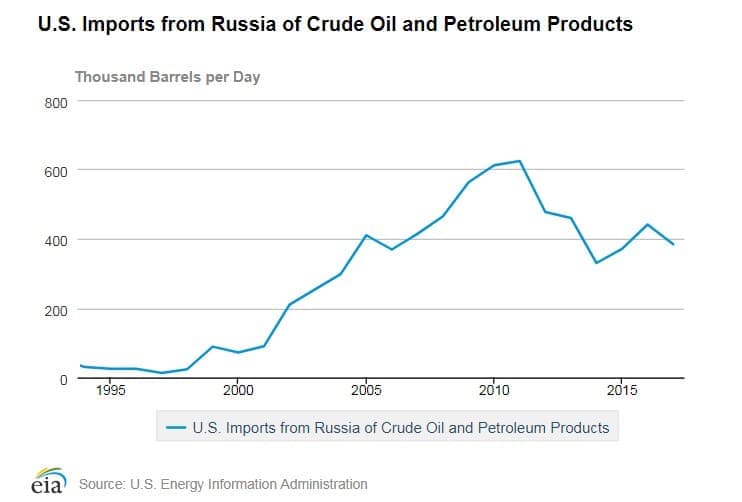At this week’s NATO meeting in Brussels, President Trump criticized Germany’s reliance on Russian natural gas:
“Germany is totally controlled by Russia. They will be getting between 60 and 70 percent of their energy from Russia and a new pipeline.”
President Trump’s point was that Germany’s purchases of Russian natural gas were making Russia richer, and that this posed a concern for NATO. He later took to Twitter to complain “What good is NATO if Germany is paying Russia billions of dollars for gas and energy?”
PBS News Hour argues that the President’s numbers are incorrect in any case. The story notes that Trump was referring to the Nord Stream 2 Pipeline that is being built between Russia and Germany, but:
“Trump’s assertion that the pipeline will provide 60 to 70 percent of Germany’s energy is incorrect. While Russia will be able to increase the amount of natural gas it sells to Germany through the pipeline, Russian gas will only provide a sliver of the overall energy Germany needs. Germany’s energy comes from a diverse mix of oil, coal and renewables. Less than one fifth of the country’s power is powered by natural gas; at the moment, just 9 percent of the country’s power is generated by Russian gas.”
This led me to wonder, by comparison, what percentage of U.S. oil imports are being provided by Russia. U.S. reliance of Russian crude oil has fallen since peaking at 624,000 barrels per day in 2011. However, in 2017 the U.S. still imported 384,000 barrels per day of crude oil and products from Russia:

(Click to enlarge)
Total Crude Oil and Products Imports from Russia
Incidentally, assuming $50 per barrel for those barrels means the U.S. spent about $7 billion on Russian oil in 2017. Related: U.S. Poised To Ease Biofuel Quotas
Total U.S. imports in 2017 were 10.075 million barrels per day. The Russian contribution was then about 3.8 percent of U.S., certainly not in the range of Germany’s reliance on Russian natural gas.
Russia was the 6th most important supplier of U.S. crude oil in 2017. The U.S. reliance on foreign crude in 2017 was higher for imports from Canada (39.9 percent), Saudi Arabia (9.4 percent), Mexico (6.8 percent), Venezuela (6.7 percent), and Iraq (6.0 percent).
Overall, OPEC provided 33.3 percent of U.S. crude oil and finished products in 2017. We are certainly making OPEC richer with our crude purchases to the tune of about $60 billion last year. I can’t say whether this poses a problem for NATO.
By Robert Rapier
More Top Reads From Oilprice.com:
- Chinese Oil Demand Growth Could Slow Down Soon
- Goldman: Brent To Retest $80 This Year
- OPEC To Rule Oil Markets Till Peak Demand



















Maybe we should ask them WHY?
Maybe allowing year-round E-15 use would just be "Too American" for them!
So, How about it API? Are you going to continue “To Fight E-15 Anyway You Can” as you so proudly promised?
President Trump broke all norms of diplomacy and protocol during the NATO meeting in Brussels on the 11th of July 2018 when he accused Germany of being “a captive of the Russians” because of its dependence on Russian energy supplies. He went on to say that “Germany is totally controlled by Russia because they will be getting 60-70% of their energy from Russia and a new pipeline”.
He was, of course, referring to the jointly European and Russian-financed Nord Stream 2 gas pipeline that would deliver a total of 110 billion cubic metres per year of Russian gas supplies under the Baltic Sea, to Germany and the European Union (EU) thus bypassing the Ukraine. It will be completed by the end of 2019.
However, he was right about Germany’s increasing dependence on Russia for its energy needs.
In 2017 Germany consumed 90.20 billion cubic metres (bcm) of natural gas of which 6.4 bcm were produced locally and 83.8 bcm were imported. Russia accounted for 57% of German natural gas imports amounting to 47.8 bcm.
When it came to crude oil. Germany consumed an average of 2.45 million barrels a day (mbd) in 2017 of which 35% or 857,500 barrels a day (b/d) were supplied by Russia.
Still, there was no justification for President Trump to be so offensive to an ally like Germany. He was unable to articulate his point that Germany’s purchases of Russian natural gas to the tunes of billions of dollars were making Russia richer and that doesn’t serve the interests of NATO.
While it is true that rising Russian gas supplies to the European Union (EU) and Germany in particular tighten Russia’s grip on the EU oil market and that gives Russia a geopolitical leverage with the EU, the sale of Russian gas to them is no different from US sale of millions of tons of American wheat to the former Soviet Union even at the height of the Cold War. One would have argued then that US security interests would have dictated depriving the Soviets of the wheat they urgently needed thus help creating domestic political turmoil and accelerating the demise of their arch enemy.
Still German Chancellor Angela Merkel was not backward in coming forward and rebuking President Trump by saying Germany makes its own independent decisions and denying his claim that her country was “totally controlled” by Russia. She also made the point that she needed no lessons in dealing with authoritarian regimes, recalling she had been brought up in East Germany when it had been part of the Soviet Union’s sphere of influence.
Putting geopolitics and political pressure from the United States aside, the Nord Stream 2 is an economic issue first and foremost.
Dr Mamdouh G Salameh
International Oil Economist
Visiting Professor of Energy Economics at ESCP Europe Business School, London